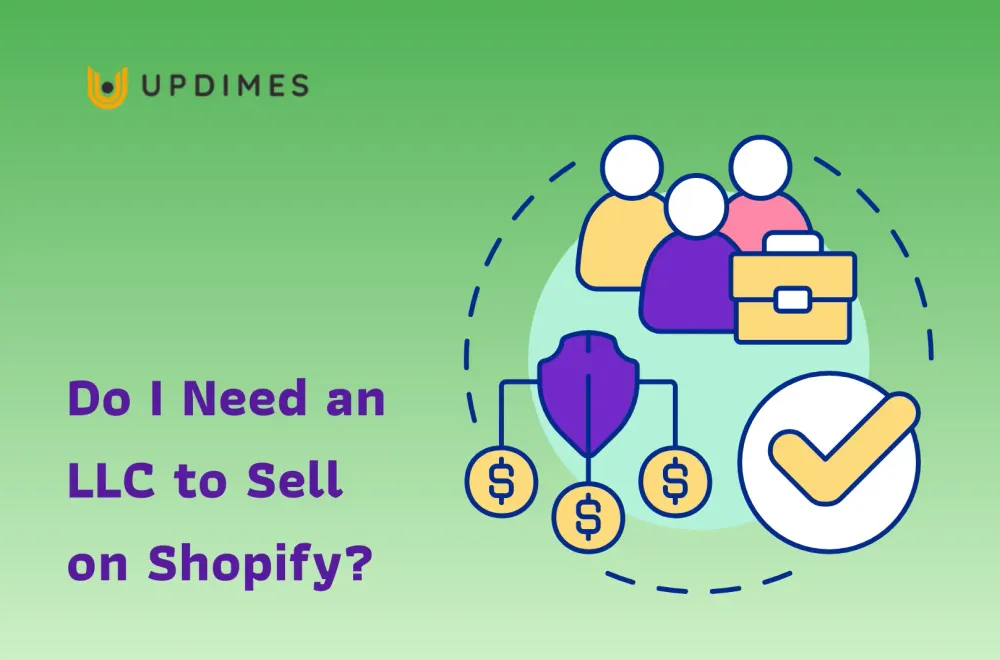Do I Need An LLC to Sell on Shopify?

If you've ever contemplated starting your own online business on Shopify, whether to form a Limited Liability Company (LLC) might have crossed your mind. As an aspiring entrepreneur navigating the vast world of eCommerce, understanding the legal and financial implications of your venture is crucial.
In this article, let’s find the answer to the question “Do I need an LLC to sell on Shopify”, and explore the benefits of establishing an LLC for your Shopify store. That can help you make an informed decision that sets your business up for success.
What is an LLC?
An LLC, or Limited Liability Company, is a business entity that offers a unique combination of liability protection and operational flexibility. It provides a legal framework that separates the business from its owners, known as members. As a result, the personal assets of the members are protected from business debts and legal liabilities, reducing personal financial risk.
Many entrepreneurs and small business owners favor LLCs for their simplified administrative requirements and tax advantages. They offer the option to be taxed as a pass-through entity, meaning profits and losses flow through to the members' personal tax returns, avoiding double taxation.
How is LLC Different from Other Licenses?
LLC vs business license
An LLC and a business license serve distinct purposes in the business world. A business license is a permit issued by a government authority that grants permission to operate a specific type of business within a designated area. It ensures that the company complies with local regulations and laws and is a prerequisite for legal operation.
On the contrary, an LLC is a formal business structure that gives its owners personal liability protection. When a business operates as an LLC, the member's personal assets are shielded from business debts and legal liabilities. This separation ensures that the personal wealth of LLC members is protected in case of lawsuits or financial issues faced by the company.
In summary, while a business license is essential for any legal business operation, forming an LLC offers limited liability protection to its owners, thereby safeguarding their personal assets from potential business risks.
LLC vs sole proprietorship
The key difference between an LLC and a sole proprietorship lies in their legal structures and the level of personal liability assumed by the business owners.
A sole proprietorship is the simplest and most common form of business ownership. Within this structure, the business and the owner are considered the same legal entity. As a result, the owner assumes unlimited personal liability for all business debts, lawsuits, and obligations. If the business incurs debts or faces legal action, the owner's personal assets (such as their home, car, or savings) could be at risk.
Conversely, an LLC provides limited liability protection to its members. When a business operates as an LLC, it creates a legal separation between the company and its owners. This separation ensures that the personal assets of the LLC's members are shielded from the company's debts and legal liabilities. As a result, the members' personal wealth is generally not at risk if the business faces financial difficulties or legal issues.
Furthermore, an LLC offers potential tax advantages and a more structured and credible business image. This enhanced credibility can be beneficial when seeking business partnerships, obtaining financing, or attracting customers.
In summary, while a sole proprietorship is simpler to set up and operate, it exposes the owner to unlimited personal liability. On the other hand, forming an LLC offers personal liability protection, potential tax benefits, and a more professional business image, making it a preferred choice for many entrepreneurs.
Do I Need an LLC to Start Selling on Shopify?
No, starting a Shopify store does not require an LLC. As mentioned earlier, Shopify does not mandate proof of business registration or the formation of an LLC to open a merchant account and begin selling products or services on its platform.
However, while not a legal requirement, setting up an LLC can offer several advantages that we are discussing in the next part of this article. So, forming an LLC should be based on your business goals, risk assessment, and long-term plans.
Benefits of LLCs for Shopify Store Owners
For Shopify store owners, establishing an LLC can offer a range of valuable benefits that contribute to the success and protection of their business.
#1. Limited personal liability
One of the most significant advantages of an LLC is that it separates the business from its owner. As a result, if the LLC faces legal issues or debts, the personal assets of the store owner are generally shielded from risk. This means that even in the unfortunate event of a lawsuit against the business, personal savings, home, and other assets are protected.
#2. Privacy protection
Running a Shopify store often requires sharing contact information publicly. However, listing personal details like email, phone number, or home address on a popular platform like Shopify can leave owners vulnerable to scammers and identity thieves. Using the LLC's information as a shield, store owners can keep their personal data private, reducing the risk of unwanted solicitations and protecting their family's privacy.
#3. Professional image
Having "LLC" in the business name adds professionalism and credibility to the Shopify store. It conveys that the business is a registered legal entity and not an informal or dubious online venture. This can enhance trust and confidence in customers, partners, and suppliers, increasing business opportunities and growth.
#4. Tax flexibility
By default, LLCs are considered pass-through entities for tax purposes. This means that profits or losses from the Shopify store are passed through to the owner's personal tax return, taxed as personal income. However, LLCs also have the option to elect a different tax structure.
Depending on the store's financial situation and business goals, LLCs can be taxed as a C-corporation or S-corporation, potentially providing tax-saving opportunities and strategic financial advantages.
Do I Need An LLC to Sell on Shopify: FAQs
Do you need an LLC to sell things on Shopify?
No, you do not need an LLC to sell things on Shopify. You can start selling as a sole proprietor, which is the default legal status for a single-person business. While forming an LLC offers various benefits such as personal liability protection and privacy, it is not a strict requirement to begin selling on Shopify.
What license do I need to sell on Shopify?
The licenses and permits required to sell on Shopify vary depending on your location and the nature of your products. In general, you may need a business license, seller's permit, or other specific permits based on your industry and location. It is essential to research the regulations and requirements of your local government and industry to ensure compliance.
Can I sell products without an LLC?
Yes, you can sell products on Shopify without having an LLC. As mentioned, starting as a sole proprietor is a common way to sell without creating a formal legal entity like an LLC. However, consider the potential advantages of an LLC, such as liability protection and professionalism, as your business grows.
Do you need an LLC to dropship on Shopify?
No, you do not need an LLC specifically for dropshipping on Shopify. The process of dropshipping involves selling products to customers without holding inventory. You can start dropshipping on Shopify as a sole proprietor or under other business structures without an LLC.
Can I start dropshipping without an LLC?
Yes, you can start dropshipping without an LLC. Like any other Shopify store, you can operate as a sole proprietor or under different business structures. While forming an LLC can offer protection and credibility, it is not a mandatory requirement for dropshipping on Shopify.
In all cases, it is crucial to understand your legal obligations, taxes, and business regulations in your area and consult with legal and financial professionals if required before starting your Shopify store or dropshipping business.
Conclusion
Ultimately, establishing an LLC can bring benefits such as limited liability and a polished brand image for your Shopify store. Nevertheless, let it be known that it is not an obligatory prerequisite to commence your sales endeavors. Seeking counsel from experts in the field will ensure that you arrive at a well-informed verdict tailored to your distinct requirements.
